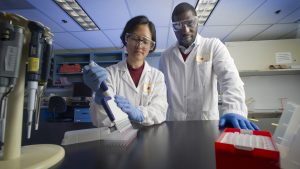The Canadian Institute for Food Safety (CRIFS) at the University of Guelph is at the forefront of global efforts to secure food supplies and protect public health through cutting-edge research and interdisciplinary collaboration.
As food systems become increasingly complex and interconnected, rigorous, science-based food safety measures are more important than ever. The Canadian Institute for Food Safety Research (CRIFS), located at the University of Guelph, serves as a key node in Canada’s national food safety network and is a world leader in advancing tools and knowledge to prevent foodborne illness and mitigate future outbreaks.
Directed by Dr. Lawrence Goodridge, Canada Research Chair in Foodborne Pathogen Dynamics, CRIFS is internationally recognized for research at the intersection of microbiology, molecular biology, data science, and public health.
From the genome to the field: accelerating food safety science
A central focus of CRIFS is advances in molecular methods and next-generation sequencing to identify, track, and control foodborne pathogens. The Institute is working closely with the Public Health Agency of Canada (PHAC) to specifically validate the use of whole genome sequencing (WGS) in the analysis of Salmonella outbreaks. This technology allows researchers to track the source of contamination with unparalleled accuracy and speed, enabling more targeted and timely interventions.
In response to the COVID-19 pandemic, CRIFS scientists also improved and streamlined molecular assays to detect SARS-CoV-2, reducing testing costs while maintaining accuracy. These efforts contributed to a more scalable and affordable testing strategy, an essential step in pandemic response and preparedness.

More broadly, CRIFS research focuses on improving our understanding of the behavior, toxicity, and persistence of pathogens in food and the environment. CRIFS helps Canada, and the world, stay ahead of emerging food safety risks by integrating microbiological innovation with data science and bioinformatics.
Rapid response and real-time food safety tools
CRIFS is actively developing rapid, field approaches to assess food safety and quality, with a focus on dairy products, one of the institute’s main research priorities. These tools are designed to be deployed in real-world settings to help producers, processors, and regulators make faster, more informed decisions to protect consumers and reduce waste.
Another important area of research is the development of field-ready diagnostics for antimicrobial resistance (AMR). As AMR poses a growing threat to human and animal health, CRIFS is working to develop technologies that enable early detection and more effective monitoring of resistant bacteria in the food supply.

In parallel, CRIFS is working with the Food and Agriculture Organization of the United Nations (FAO-UN) to better understand the risks of AMR across food systems, people, and the environment. This partnership is part of a global effort to comprehensively address AMR and ensure science-based responses at local, national and international levels.
These rapid response systems support CRIFS’ larger mission to modernize risk assessment and improve real-time food safety decision-making through science and innovation.
Community monitoring through wastewater monitoring
CRIFS also leads one of Canada’s most robust wastewater surveillance programs, tracking respiratory viruses such as SARS-CoV-2, influenza, and RSV in urban and rural populations. Wastewater monitoring provides early indicators of viral activity in communities and provides a non-invasive, cost-effective method to support public health preparedness and outbreak response.
This initiative strengthens the Institute’s growing role in environmental surveillance and syndrome monitoring, bridging the gap between microbial science and community health outcomes.
Uniting the food safety community
CRIFS co-hosts the Guelph Food Safety Seminar (GFSS) Series in collaboration with PHAC, the Canadian Food Inspection Agency, Health Canada, and other key partners. Since 2004, GFSS has served as a trusted platform to share insights, foster collaboration, and advance evidence-based food safety policy across Canada and other countries.
Protecting the food chain for future generations
CRIFS’ work reflects a deep commitment to protecting the food supply, improving public health and advancing Canada’s leadership in science-based food safety. From genomic surveillance to field diagnostics to wastewater monitoring, the Institute continues to shape a safer, more resilient food future.
This article will also be published in the quarterly magazine issue 24.
Source link

